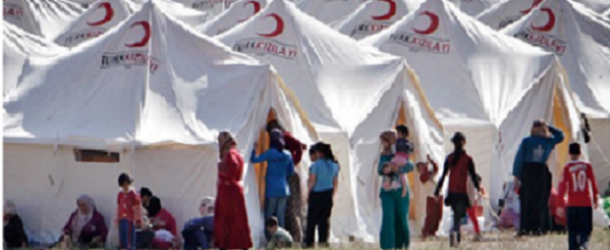I travelled to Turkey a month or so ago for a wedding, and a friend asked what I would like to do with my few days of free time. My immediate response: let’s go visit the refugee camps. Of course, my friend thought this an awful idea and we ended up frolicking in Kadikoy instead. But the urge to see the camps continues to tug at my wanderlust, and I asked myself why I would want to go on such a heart-wrenching, difficult journey to a land of tents far, far away.
After soul-searching for a while, I think I am starting to understand my urge to take in the camps first-hand. The camps are where humanity is laid bare, exposed, revealing human existence at its most primitive, most fundamental, most raw. They show the best and worst of us, in a vacuum of half a million people. It is there that tensions between Kurds, Alevis, Sunnis, Free Syrian Army supporters, and pro-Assad Turks bubble dangerously close to the surface, the coals of battle stoked by collateral bombings in Reyhanli or Akcakale. It is there that Turks, even in the holy month of Ramadan with its practices of generosity and community giving, cite strains with the ‘open door’ policy that drives up real estate prices and costs for scarce resources. It is there that widows and orphans recount stories seared in their memories of brothers, fathers, sisters, children killed in the fighting in Syria. They are left, stranded in the desert, with nowhere to go and no end in sight.
But it is also there that humanity shows its ingenuity-the Swedish furniture design magnate IKEA has rolled out the innovative flat pack build-it yourself refugee shelter in response to a growing need for durable shelters. It is there that Turkey has shown its dedication to supporting the region and maintaining some level of respect for human rights and international humanitarian law. Turkey has declared it will not turn away refugees; it has also constructed a camp solely for Kurds, and one for Assyrian Christians, who specifically requested such an isolated enclosure to fit their particular needs. It is there that political freedoms take root, when in January, the refugees participated in their first democratic election to choose camp leaders and administrators.
It is there that we can find stories of true love, love that lifts us up above all material woes. I heard a story of one young Syrian Turkmen who, after spending time in a refugee camp, resettled into a small town outside of Hatay with her extended family. Having lost her mother, her brother, all of her earthly goods, she woke up in Turkey only to find a new life for her waiting in the arms of a young Turkish man living in the house next door. It is tales like these that give me hope. For in the camps I see the creation of something new, the reordering of the old, and the multiethnic, multicultural trials that come with understanding diversity. Life in the camps is surely tough, but I hope that when the time comes those refugees will be able to start life anew, bolstered by the sights of humanity laid bare that they have witnessed in places like Kilis, Midyat, and Antakya.
Leslie ESBROOK

























































